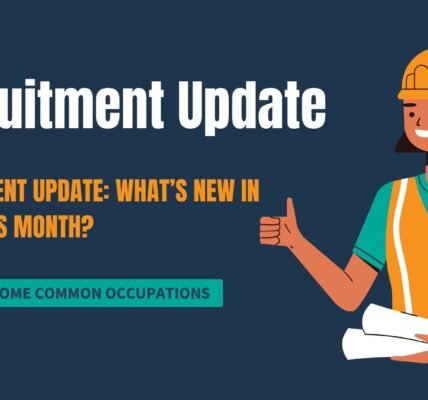The recruitment world constantly changes. Companies need to adapt to evolving recruitment tactics to stay competitive. From new technology to changing candidate expectations, the industry keeps growing. To attract and retain top talent, you must update your strategies. In this blog, we will explore the latest industry updates and how they affect your hiring process.

Adapting to Changing Candidate Expectations
Candidate expectations have shifted over the years. Today’s job seekers look for more than just a paycheck. They want growth opportunities, flexibility, and a positive company culture. These changes require businesses to rethink how they approach hiring. Companies that fail to keep up with evolving recruitment tactics may struggle to attract the right talent.
To address this challenge, focus on building an employer brand that appeals to the modern workforce. Candidates now prioritize remote work options, clear career progression, and inclusive work environments.
How to Adapt:
- Offer flexible work arrangements, such as remote or hybrid options.
- Create clear career paths and communicate opportunities for advancement.
- Promote a culture of inclusivity to attract a diverse range of candidates.
Leveraging Technology in Recruitment
Technology has revolutionized recruitment. Companies now use artificial intelligence (AI), applicant tracking systems (ATS), and digital tools to streamline the hiring process. However, keeping up with the latest evolving recruitment tactics means using technology in the right way. While automation saves time, companies must balance tech with a human touch.
AI can help with initial candidate screening, but it’s important to maintain personal engagement during interviews. Candidates appreciate a more personal approach, even in a tech-driven world.
How to Adapt:
- Use AI to handle repetitive tasks, like screening resumes or scheduling interviews.
- Personalize communication with candidates to create a positive experience.
- Implement an ATS to manage applications and track candidates efficiently.
The Role of Social Media in Recruitment
Social media platforms play a bigger role in recruitment than ever before. LinkedIn, Twitter, and even Instagram are becoming essential tools for finding talent. Many companies now use these platforms to advertise open positions and engage with potential candidates.
As part of evolving recruitment tactics, social media allows companies to reach passive candidates. These individuals may not actively search for jobs, but they might consider new opportunities when approached on social media.
How to Adapt:
- Use LinkedIn to post job listings and reach out to candidates directly.
- Engage with potential candidates on platforms like Twitter or Instagram.
- Showcase your company culture and values through social media content.
Data-Driven Recruitment Decisions
Data analytics now drives recruitment decisions. Many companies collect and analyze data to improve their hiring strategies. This data includes candidate sourcing channels, time-to-hire, and employee retention rates. With these insights, you can adjust your recruitment tactics to achieve better outcomes.
Tracking these metrics allows companies to refine their hiring processes. For example, if a certain job board consistently produces strong candidates, you can allocate more resources there. Data-driven decisions are a key part of evolving recruitment tactics.
How to Adapt:
- Track and analyze key recruitment metrics to make informed decisions.
- Use data to identify which platforms or strategies work best for finding candidates.
- Continuously adjust your recruitment process based on data insights.
Prioritizing Diversity and Inclusion
Diversity and inclusion (D&I) are critical components of modern recruitment. Candidates increasingly prioritize working for companies that embrace diversity. Inclusive hiring practices improve a company’s image and attract a wider pool of talent.
Evolving recruitment tactics must now include efforts to reduce bias in the hiring process. This can involve using blind hiring techniques or ensuring that job postings appeal to all candidates. Creating an inclusive recruitment process benefits both the company and candidates.
How to Adapt:
- Use blind hiring practices to reduce unconscious bias during the selection process.
- Ensure job descriptions use inclusive language to attract diverse candidates.
- Train hiring managers on diversity and inclusion best practices.
The Importance of Candidate Experience
In today’s competitive market, candidate experience matters. Many candidates will judge a company based on how smooth and transparent the recruitment process is. A poor experience may drive top talent away. One of the latest evolving recruitment tactics focuses on enhancing candidate experience at every step.
From application to onboarding, companies should streamline the process and provide consistent communication. Candidates appreciate timely feedback, simple application processes, and a welcoming interview environment.
How to Adapt:
- Simplify the application process to make it user-friendly and quick.
- Provide regular updates to candidates throughout the hiring process.
- Create a welcoming and engaging experience during interviews and onboarding.
Adopting Agile Recruitment Strategies
The pace of business is faster than ever, and recruitment needs to keep up. Agile recruitment is one of the newest evolving recruitment tactics. This approach emphasizes flexibility, adaptability, and rapid response. Agile recruitment allows companies to quickly adjust their hiring strategies in response to market changes.
Agile recruitment also involves working closely with hiring managers and continuously updating job descriptions to fit the needs of the business. This method helps companies stay ahead of the competition by filling positions faster and more effectively.
How to Adapt:
- Develop flexible recruitment strategies that allow quick adjustments.
- Work closely with hiring managers to ensure job descriptions align with business needs.
- Use short recruitment cycles to fill positions quickly and efficiently.
The Gig Economy’s Impact on Recruitment
The rise of the gig economy has changed how companies approach recruitment. More professionals now prefer contract work or freelance gigs over traditional full-time employment. Companies must adapt their recruitment strategies to accommodate this shift.
Evolving recruitment tactics now include offering more project-based or part-time opportunities. This approach appeals to workers who prefer flexibility and independence over long-term commitments.
How to Adapt:
- Offer short-term contracts or freelance opportunities to attract gig workers.
- Create clear project scopes and timelines for contract roles.
- Build strong relationships with freelancers to maintain quality and consistency.
Conclusion
Recruitment in 2024 looks different from years past. Companies must adapt to evolving recruitment tactics to stay competitive and attract the best talent. From leveraging technology to offering flexible work arrangements, recruitment strategies must evolve to meet candidate expectations.
Embracing data-driven decisions, improving candidate experience, and focusing on diversity and inclusion are key elements of success. As you navigate the hiring landscape, keep these industry updates in mind to ensure your recruitment efforts succeed in a rapidly changing world.





